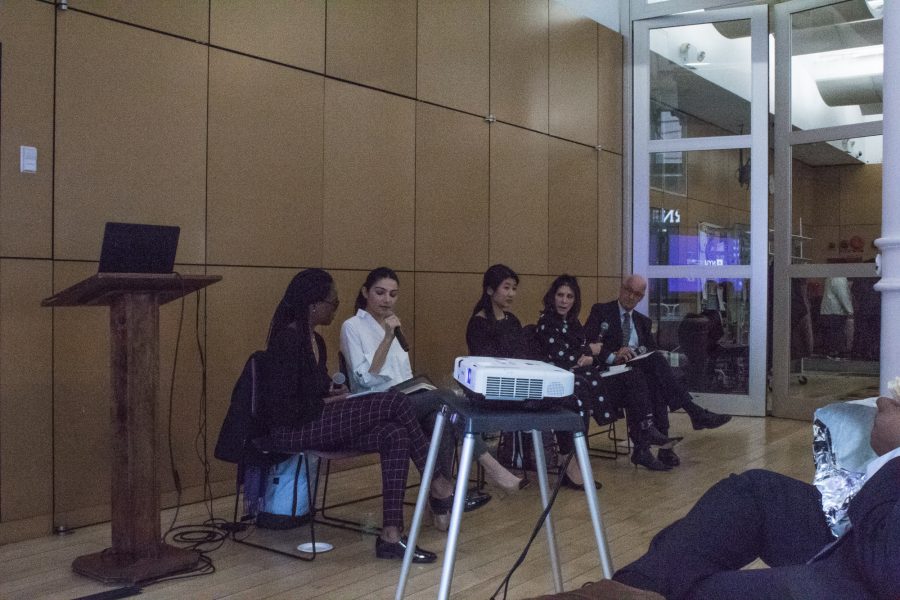Administrators and students discussed the added difficulty for international and study away students attempting to access wellness resources due to cultural and language differences at a town hall held in Kimball Hall on Tuesday.
Around 30 students and administrators attended the town hall, hosted by NYU President Andrew Hamilton and CAS senior and Student Government Chair Hüsniye Çöğür and moderated by Jakiyah Bradley, a Gallatin junior and Senator-at-Large for students experiencing food insecurity. The event began with a summary of the various wellness resources NYU offers, presented by Bradley and Claire Liu, a Tandon senior who is Vice Chair of student government’s Health and Wellness Committee and also was a guest panelist at the hall. Bradley then began asking the panelists questions before the audience Q&A at the end. The town hall was overwhelmingly about mental health and wellness, but neither the student suicide that occurred earlier this semester nor the one that occurred in the fall was mentioned at the event.
During the Q&A, GLS sophomore Raj Kittusamy spoke about marginalization students can face while abroad and asked what resources are available for students. Hamilton and Chief Diversity Officer Lisa Coleman — who was in the audience — emphasized preparedness.
“Preparing them for the culture they will encounter, preparing for some of the possible experiences they may have, comments in the street, whatever they may be,” Hamilton said. “We can prepare our students not only to deal with that culture, but perhaps to learn from it and indeed to find the dimensions of that culture that are positive and reaffirming and inclusive.”
Assistant Vice President of NYU Student Mental Health Zoe Ragouzeos was also among the crowd and was given the mic to speak on the global sites. Ragouzeos said that 11 of 13 study away sites have counselors, with only Tel Aviv and Accra lacking them. In the 11 cities, weekly sessions are available, compared to the bi- or tri-weekly availability of counselors at the Washington Square campus. Additionally, student health records are electronically transferred to the sites.
Along with holding orientation sessions, the university informs students studying away of the resources available to them at global sites, such as counselors and administrators designated to help with various issues. Student government has also partnered with administrators to create a Global Equity Fellowship — students selected for this program serve as leaders and employ projects in regards to issues of diversity at the global sites.
Kittusamy told WSN that he felt the responses by Coleman and Hamilton were dismissive, claiming that the schedules of counselors at study away sites can also get backed up and that Global Equity Fellows can sometimes prioritize their own problems over supporting students at the sites.
“I think [Hamilton and Coleman] are aware of the global site infrastructure, but not necessarily how unreliable and limited it can be in practice,” Kittusamy said. “I don’t feel like their responses took into consideration the impact these limitations have on the student perspective and experience.”
Besides students studying away, the panelists also discussed international students. One of the first questions asked was what each panelist sees as a top concern in terms of wellness at NYU.
Hamilton said that the university should focus on the wellness of this cohort, who may have added difficulty due to different cultural attitudes surrounding mental health.
“One area that we are paying very close attention to and we need to pay even closer is the stresses that particularly fall on our international students,” Hamilton said. “Trying to explain particular issues around physical health and also mental health in a language that’s not your first [is difficult].”
Ragouzeos spoke about how the Student Health Center has continued to work with the Office of Global Services, which all international students interact with, to increase awareness and accessibility surrounding wellness resources.
“One thing that we both agree on is that we need to get into mandatory spaces where they’re already required to be and say something about services,” Ragouzeos said. “At the visa meeting this year we are going to go in and say something about health and wellness.”
The panelists discussed the potential effects of cultural differences on international students. Specifically, they mentioned issues with not only having access to wellness resources, but also using them. Vice Chancellor and Senior Vice Provost for Global Programs and University Life Linda Mills was a guest panelist at the town hall and said that to help international students who may be in need but also face stigma when reaching out for help, the university must consider how they phrase any offer of assistance.
“How you frame the question for people in terms of access and resources really matters,” Mills said. “If it’s about ‘if I do this, my work will improve,’ oftentimes students are more amenable to that message than ‘go to counseling.’”
Liu said that her committee spoke with the Chair of the Tenured Faculty Council, as well as the International and Global Student Councils, about the issue and are looking at how to tailor programs to target specific cultures and school populations.
“A lot of international students come from countries that don’t necessarily recognize mental illness or mental well-being,” Liu said. “So [we asked], even if NYU has so many services, because students are not acknowledging that in the first place, are we getting through to them?”
Email Victor Porcelli at [email protected].


























































































































































